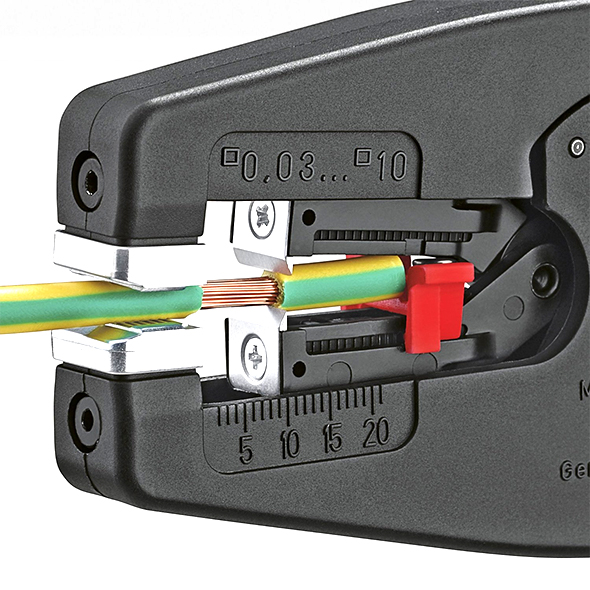
I recently decided that I needed new automatic wire strippers. Well, self-adjusting wire strippers. I had just started using wire end ferrules to tame stranded wires, and ordered a Knipex crimper. I figured I’d give Knipex’s wire strippers a try.
I worked with my new Knipex 12 62 180 wire stripper last night, and it was a very good experience. It’ll take many more dozens or even hundreds of uses, and working with a wider range of wiring sizes and styles before I know for sure that it’s a winner, but for now I’m quite pleased with my purchase.
I was a little anxious about the order, due to several negative Amazon reviews. While the tool is very plasticky, something I’ve never experienced in a Knipex tool before, it seems to be sturdily made.
See Also: My Wire Strippers and Electric Combo Tools Mini Reviews
These strippers can handle 24 to 10 AWG wires (0.2 up to 6.0 mm^2), and can cut wires up to 2.5 mm^2 thick.
They said to be able to strip 24 to 10 AWG wires with standard insulation. I recently bought a slew of hookup wire with new fancy shmancy “environmentally-friendly” insulation (I didn’t want PVC), and the wires have thinner-than-usual insulation for their wire gauge. But these strippers took the insulation off these wires cleanly and quickly.
My next test will be to use them on silicone test lead wire and then some shielded 2-conductor cables.
The adjustable length stop is kind of a pain to set. It requires squeezing the tabs of a little red stopper, and sliding it along a grooved rail until it’s where you want it. Maybe this will get easier with some more practice.
There’s not a lot of metal in the tool. Aside from some metal internal parts, such as the spring, only the cutter blades and V-shaped stripping blades are metal. Knipex emphasizes that the body is fiberglass-reinforced, for strength.
But on the other hand, my new Knipex crimpers are all metal aside from the handles, and they are quite weighty. If I were an installer or tech that had to carry these strippers around all day, I’d sure be glad for the lightweight construction.
The depth stop and blades can be replaced.
Knowing what I know now, I would still buy these Knipex wire strippers again, although I can’t shake the feeling that they should cost half of what they do.
I’ll be sure to update or follow up to this post if my feelings change with more use.
Price: $40
Buy Now(via Amazon)
I purchased my sample from Amazon at full retail pricing.
Knipex also offers a higher priced model, 12 42 195, that is said to be a universal insulation stripper.

This other model is higher priced – ~$90 at Amazon, and can be used on a wider range of wiring sizes (32 to 7 AWG).

For the extra money – and this version costs more than double the price of the smaller model – you get much more robust-looking jaws, as well as beefier wire-holding jaws that look to be made of metal.
You also get additional stripping length adjustment with this model. Going by the scales, the smaller version can be set to lengths of 6 to 18 mm, and this one can be set from 2 to 21 mm. The length stop looks longer and perhaps easier to use.
Lastly, it can cut stranded wires up to 10 mm^2 thick, and solid wires up to 6 mm^2.
Price: $90
Buy Now(via Amazon)
I might buy these at some point, but only if I’m interested in doing a comparison for ToolGuyd, or something of the sort editorial-related. I have worked with wires thinner than the less expensive wire stripper can handle, but I do also still own other strippers I can call on if needed.
The main reason I bought the above Knipex wire stripper is so that I can more easily achieve consistent and repeatable stripping lengths. When stripping length is unimportant, I might stick with my Stride-made Craftsman Pro’s. Here are some thoughts of the other wire strippers I own.
I wish that the strippers I just bought were more robust, and that they had the better-looking stripping blades and gripping jaws, but not for more than double the price.